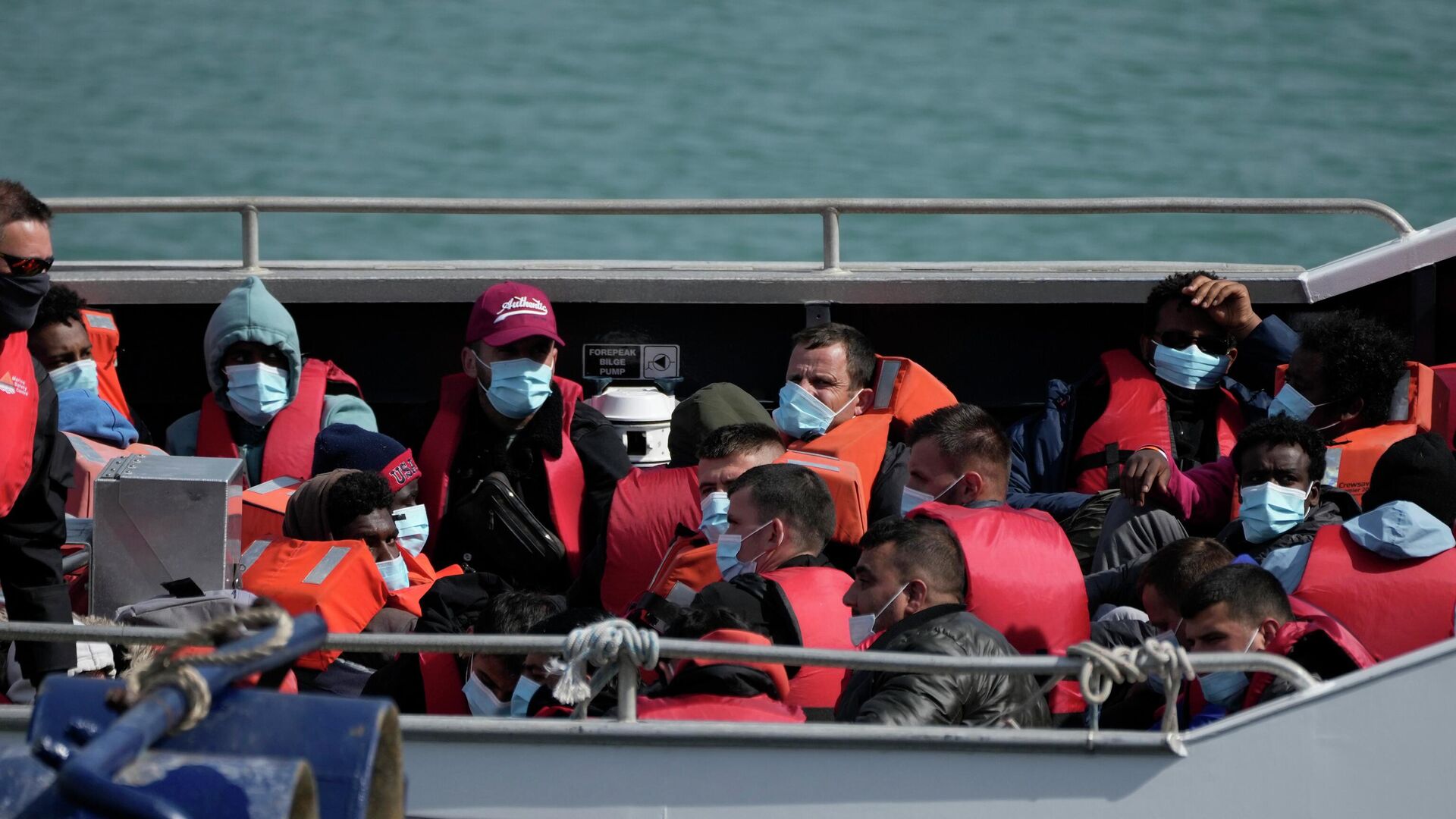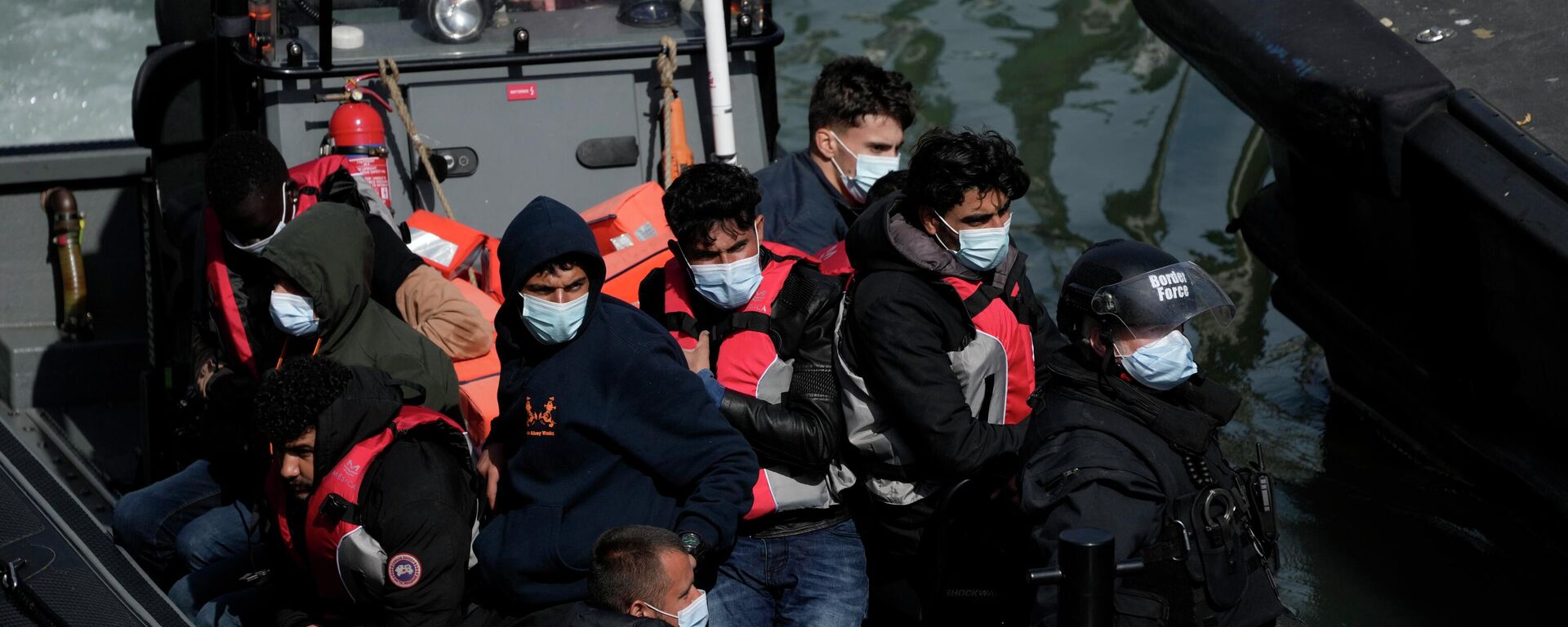What a Downer: Aussie Ex-Minister's Report Details Problems in UK Border Force

© AP Photo / Matt Dunham / Illegal immigrants trafficked from France in small boats and were picked up in the Channel, wait to be disembarked from a British border force vessel in Dover
Subscribe
Former Australian Liberal Party foreign minister Alexander Downer's review backed many of the British government's most criticised plans for halting people-trafficking, but warned that the UK Border Force was not properly equipped to stem the tide of illegal immigration by sea from Europe.
A new government report has highlighted failings in the UK's Border Force — as numbers of immigrants trafficked from mainland Europe is set to double again.
The "wide-ranging" review of Britain's customs and immigration service by former Australian foreign affairs minister Alexander Downer was ordered by Home Secretary Priti Patel in February this year.
Downer's final report was released on Wednesday afternoon.
Lack of Planning for the Migrant Crisis
Downer had harsh words for the force's lack of forward-thinking, which he said was "short-term and broadly focused on the next crisis or immediate busy period". He called it "concerning" that planning for summer 2022 was left until May of this year.
"The frustration about the short-term planning is felt significantly at port level," he wrote. "I heard from several port operators, as well as Border Force staff, about the impact this lack of data had on day-to-day operations as well as longer term investment in the infrastructure of the immigration hall".
Downer also warned that the Border Force Maritime command, a force of 30 vessels and 230 crew, was under-equipped to deal with the ever-rising number of illegal immigrants trying to reach the UK in small boats.
"The size and capability of the Border Force Maritime command predates the escalation in small boat crossings and the task in the Channel now consumes nearly all available resource to the command, with other operational activity being undertaken on an exceptional basis only," he wrote.
The House of Commons Home Affairs Committee reported on Monday this week that the total number of people trafficked across the English Channel and North Sea from mainland Europe this year could reach 60,000, more than twice the figure for 2021.
"The craft that are used to make the crossing are unstable, frequently unseaworthy, overloaded and poorly navigated," Downer wrote. "The risk to life is significant as was demonstrated by the loss of 27 lives in November 2021."
Downer concluded that "the problem of illegal entry by small boats is not solvable in the Channel by Border Force". But he said the government's New Plan for Immigration — which has drawn fire and legal challenges from pro-immigration activists and refugee aid charities — includes other measures that could solve crisis, "albeit with some challenges and risks remaining".
Turning Back the Boats
The former Australian minister also cautioned that neither Border Force Maritime nor the Royal Navy were capable of search-and-rescue operations in the English channel, saying that more "appropriate" vessels and crews needed to be sourced.
But in a paragraph that may anger campaigners and some opposition parties, Downer said "turnaround tactics" should be made "available" to the Border Force — and that the work could be farmed out to private companies.
"Taking any given tactic off the table is unhelpful where one of the desired outcomes is a deterrent effect," he wrote. "The government should maintain the option of turnaround tactics when it is safe and legal to do so".
He argued that "Contracted vessels and specialist crews may be more effective in conducting these challenging operations".
And Downer backed the government's much-criticised policy of sending illegal immigrants who claim political asylum to the east African state of Rwanda for resettlement, saying the UK could learn from Australia's now-ended policy of "third-country processing" of claimants at a detention centre on the island of Manus in neighbouring Papua New Guinea.
"The rapid movement of people that have entered the UK illegally to a third country reduces the risk of the removal process being frustrated," he said, adding that the policy should be applied to "all cohorts of people who enter the UK illegally".
"The lessons from Australia’s experience on this issue suggest that the pace with which people are moved, along with avoiding a running commentary on numbers, is useful in achieving success," Downer advised.
But he also believed that a "strategic, mutually beneficial agreement with France would be desirable to secure a sustainable solution to the challenge of illegal migration by small boats".
Pay and Training Inequalities
Speaking to Border Force agents, Downer found there were major pay disparities — even between agents doing the same job — due to staff inheriting salaries and overtime rates from previous organisations, which "created tension within the workforce".
"There is fundamental unfairness created by the different terms and conditions that staff are on; some staff are on significantly better terms than the colleagues they are working alongside, performing the same role in the same location," he wrote.
He also found inconsistent levels of training between staff, with the "most troubling" area being "Physical Safety," where a level three training is required before they can defend a colleague from a violent attack or physically restrain a suspect.
"But this level of training is not mandated, so colleagues cannot be confident that all colleagues wearing the same uniform as them will necessarily be able to assist them in a situation where that is required," Downer stressed.
Patel said in a tweet that she "welcomed" Downer's report.
"He's conducted useful research, analysis and brought his significant experience and judgement to make a number of constructive recommendations," the home secretary said. "We will develop a robust and swift plan to deliver on them".



